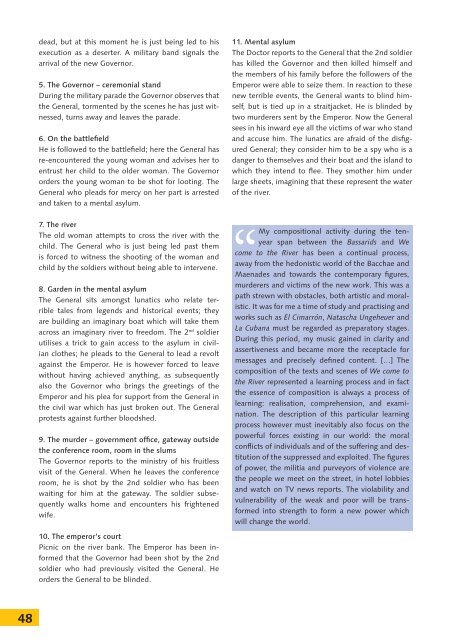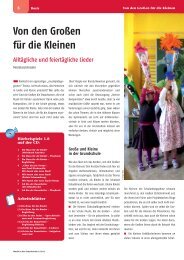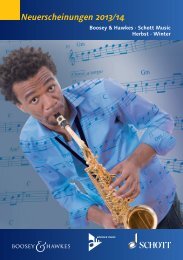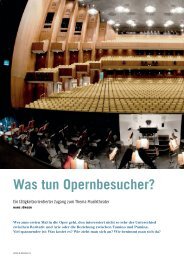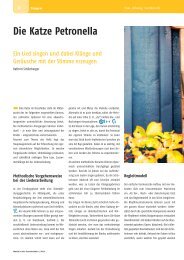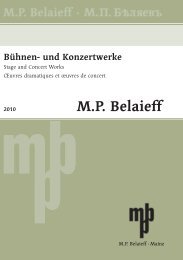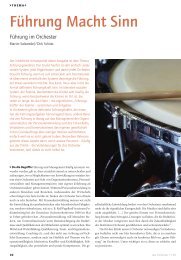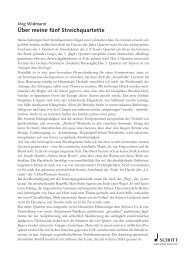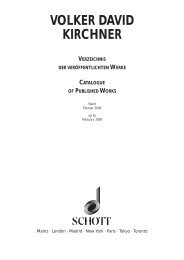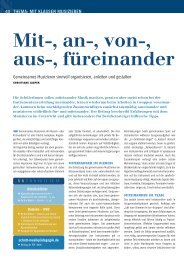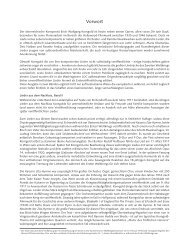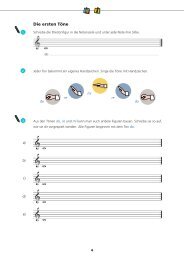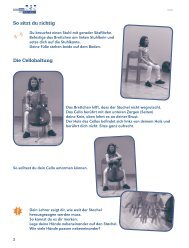HANS WERNER HENZE - Schott Music
HANS WERNER HENZE - Schott Music
HANS WERNER HENZE - Schott Music
Sie wollen auch ein ePaper? Erhöhen Sie die Reichweite Ihrer Titel.
YUMPU macht aus Druck-PDFs automatisch weboptimierte ePaper, die Google liebt.
48<br />
dead, but at this moment he is just being led to his<br />
execution as a deserter. A military band signals the<br />
arrival of the new Governor.<br />
5. The Governor – ceremonial stand<br />
During the military parade the Governor observes that<br />
the General, tormented by the scenes he has just witnessed,<br />
turns away and leaves the parade.<br />
6. On the battlefield<br />
He is followed to the battlefield; here the General has<br />
re-encountered the young woman and advises her to<br />
entrust her child to the older woman. The Governor<br />
orders the young woman to be shot for looting. The<br />
General who pleads for mercy on her part is arrested<br />
and taken to a mental asylum.<br />
7. The river<br />
The old woman attempts to cross the river with the<br />
child. The General who is just being led past them<br />
is forced to witness the shooting of the woman and<br />
child by the soldiers without being able to intervene.<br />
8. Garden in the mental asylum<br />
The General sits amongst lunatics who relate terrible<br />
tales from legends and historical events; they<br />
are building an imaginary boat which will take them<br />
across an imaginary river to freedom. The 2 nd soldier<br />
utilises a trick to gain access to the asylum in civilian<br />
clothes; he pleads to the General to lead a revolt<br />
against the Emperor. He is however forced to leave<br />
without having achieved anything, as subsequently<br />
also the Governor who brings the greetings of the<br />
Emperor and his plea for support from the General in<br />
the civil war which has just broken out. The General<br />
protests against further bloodshed.<br />
9. The murder – government office, gateway outside<br />
the conference room, room in the slums<br />
The Governor reports to the ministry of his fruitless<br />
visit of the General. When he leaves the conference<br />
room, he is shot by the 2nd soldier who has been<br />
waiting for him at the gateway. The soldier subsequently<br />
walks home and encounters his frightened<br />
wife.<br />
10. The emperor’s court<br />
Picnic on the river bank. The Emperor has been informed<br />
that the Governor had been shot by the 2nd<br />
soldier who had previously visited the General. He<br />
orders the General to be blinded.<br />
11. Mental asylum<br />
The Doctor reports to the General that the 2nd soldier<br />
has killed the Governor and then killed himself and<br />
the members of his family before the followers of the<br />
Emperor were able to seize them. In reaction to these<br />
new terrible events, the General wants to blind himself,<br />
but is tied up in a straitjacket. He is blinded by<br />
two murderers sent by the Emperor. Now the General<br />
sees in his inward eye all the victims of war who stand<br />
and accuse him. The lunatics are afraid of the disfigured<br />
General; they consider him to be a spy who is a<br />
danger to themselves and their boat and the island to<br />
which they intend to flee. They smother him under<br />
large sheets, imagining that these represent the water<br />
of the river.<br />
“<br />
My compositional activity during the tenyear<br />
span between the Bassarids and We<br />
come to the River has been a continual process,<br />
away from the hedonistic world of the Bacchae and<br />
Maenades and towards the contemporary figures,<br />
murderers and victims of the new work. This was a<br />
path strewn with obstacles, both artistic and moralistic.<br />
It was for me a time of study and practising and<br />
works such as El Cimarrón, Natascha Ungeheuer and<br />
La Cubana must be regarded as preparatory stages.<br />
During this period, my music gained in clarity and<br />
assertiveness and became more the receptacle for<br />
messages and precisely defined content. […] The<br />
composition of the texts and scenes of We come to<br />
the River represented a learning process and in fact<br />
the essence of composition is always a process of<br />
learning: realisation, comprehension, and examination.<br />
The description of this particular learning<br />
process however must inevitably also focus on the<br />
powerful forces existing in our world: the moral<br />
conflicts of individuals and of the suffering and destitution<br />
of the suppressed and exploited. The figures<br />
of power, the militia and purveyors of violence are<br />
the people we meet on the street, in hotel lobbies<br />
and watch on TV news reports. The violability and<br />
vulnerability of the weak and poor will be transformed<br />
into strength to form a new power which<br />
will change the world.<br />
”


